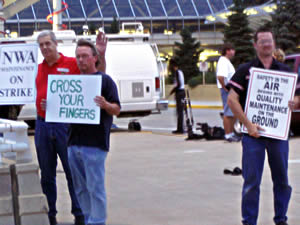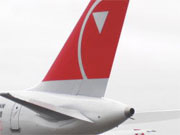 |
| A dozen or so strikers heft signs and wave at passing cars in the airport departures area. Many passing drivers honk enthusiastically in support. And yet the passengers in those cars continue on, uninterrupted, to their departure gates, showing no obvious compunction about crossing the picket line to board their Northwest flights. (MPR Photo/Annie Baxter) |
St. Paul, Minn. — Last week striking Northwest Airlines mechanics fanned out to three Twin Cities hotels and tried to block busloads of replacement workers heading to the Twin Cities airport.
Ted Ludwig, head of the mechanics union's Twin Cities local, said the mechanics wanted to give the labor movement something to cheer about.
"This is the precursor of Labor Day weekend," Ludwig said. "If we can't exercise our rights as a labor organization two days before labor day weekend, we don't deserve to be in a union."
But the labor movement has a lot to lament these days. Consider the mechanics union's picket line at Minneapolis-St. Paul Airport.
A dozen or so guys heft signs and wave at passing cars in the airport departures area. Many passing drivers honk enthusiastically in support.
And yet the passengers in those cars continue on, uninterrupted, to their departure gates, showing no obvious compunction about crossing the picket line to board their Northwest flights.
Northwest says it believes the strike has had no significant effect on its revenues. What's more, the picketers themselves are almost entirely striking union members. The absence of other Northwest unions like the pilots or machinists is achingly obvious.
The scene gives the impression that the picket line has lost the power it had in a bygone era.
"This picket line was sacred. In our culture, it meant something. People just didn't cross the picket line," says labor relations expert Mario Bognanno at the University of Minnesota Carlson School of Management.
Bognanno says the picket line at Northwest is weak for some unique reasons. First, the striking mechanics union has a testy relationship with some of the other unions. And second, those unions say a sympathy strike would send the airline into bankruptcy.
But still, Bognanno says it used to be the case that even company management would show a certain reverence for the picket line. He says since the 1930s, companies have had the legal right to bring in replacement workers to break strikes, but companies seldom resorted to that strategy out of respect, he says, for the picket line.
"It was a legitimate expression of worker frustration with the position of the employer. And it was viewed that the strike was a healthy tension to get the employer to reassess its situation and to extend concessions to workers. That was the nature of the game back in the '40s, '50s, and '60s," he points out.
Bognanno says the Northwest strike is part of a trend that began in the 1980s. After President Reagan replaced striking air traffic controllers, companies became more hard-nosed about bringing in replacements, which Northwest is now doing no-holds barred. The company has brought in some 1,500 replacements for striking mechanics.
Bognanno says if the picket line has lost some of its relevance, so has organized labor itself. According to statistics from the U.S. Census Bureau, union membership in the private sector has dropped from 16.5 percent of workers in 1983 to about 8 percent two years ago.
And what's more, Bognanno says, organized labor's recruiting methods are outdated. He says that's part of the reason why three major unions have recently quit the AFL-CIO. The splinter groups say the labor behemoth, made up of more than 50 unions, was not doing enough to bolster flagging union membership.
But there's no agreement on what unions need to do differently in order to modernize and recruit new members. O.V. Delle-Femine, the head of the the Aircraft Mechanics Fraternal Association, or AMFA, the union striking Northwest, has his own ideas.
"I think that the way that labor is losing the public is that the old style, dinosaur type of philosophy -- that's central, up top, they're the boss, they're untouchable, and you do what we say or you're out the door," he argues.
Delle-Femine says his union is unique because it allows members to sit in on negotiations. He says this inspires rancor in other unions.
"We're very controversial because we listen to our members and we work for them," Delle-Femine says. "See that's the difference. Our union works for the members. That's the difference."
Many AMFA critics say the union is controversial not because of its internal structure, but because AMFA raided other unions to gain members. At Northwest, AMFA won a bitter battle with the International Association of Machinists to represent mechanics in 1998.
But at least one IAM member agrees with Delle-Femine's view that unions' seat of power should be in the membership itself. Marty Kanable is striking in sympathy with AMFA -- he's one of only a handful of IAM members who have chosen this route.
At AMFA's strike headquarters in a little trailer along Interstate 494 in Bloomington, Kanable says there needs to be more solidarity among rank and file members of all unions -- both to strengthen the labor movement, and to win this particular strike.
"The conclusion is that we cannot depend on the union leaders to defend us from companies like Northwest," Kanable says. " We're not out to implicate the union leadership. We're out to point the way forward for the workers themselves to chart the solution, to make the solution, to make the union, to think of themselves as the union and to act like that. No one's gonna do it for you. We're gonna have to do it."
Kanable wants to embolden other IAM members to come out in support of AMFA. He says his union's contract with Northwest provides job protections if they choose not to cross the picket line. Northwest would not comment on that point.
But the head of Kanable's union, Bobby DePace, agrees that those protections exist, and says members are free to exercise them. But he's not encouraging it. For his part, he doesn't think that there's a lack of union solidarity at Northwest right now. He says AMFA is simply a rogue union. He says union solidarity is very important to the IAM, even at a more global level. De Pace points out that his union belongs to the International Transport Workers' Federation, a group that includes hundreds of unions around the world. He says those unions meet and talk about worker solidarity across national boundaries.
"That is the future of unions, unions are going to have to go global as companies are," De Pace says. "We sign letters of solidarity of understanding and support. And people from Europe, if they have problems over there, they're our problems. We support them any way we can."
That might be an appropriate message for Labor Day, albeit an ironic one, given the division of labor right under Northwest's roof.





